- Home
- Andrew Wareham
Virtue’s Reward (A Poor Man at the Gate Series, Book 11) Page 2
Virtue’s Reward (A Poor Man at the Gate Series, Book 11) Read online
Page 2
"There is to be a conference on the Belgian problem, Captain Hood. It does appear that the British position must be one of attaining stability at all costs. The Dutch will be outraged; the Prussians will be angry; the Austrians will object most strongly - their empire is increasingly fragile; the Russians will make threats. The Turks will not be invited and the Spanish will be ignored, as always. The Portuguese will continue to accept British guarantees of their frontiers, so they are no worry."
"So Britain will be in a minority, effectively of one, sir."
"Yes. We will get our way, of course, because the French are in uproar and cannot organise a coalition against us."
That seemed an entirely reasonable analysis - Britain was, for the while, the preeminent power of Europe, and hence of the world. It was ironic that the sole lasting result of the Napoleonic years had been to promote Britain to the status of arbiter of Europe and to make it head of a growing empire.
All that remained now was to settle the blame.
Hood did not wish to be made scapegoat, brought the discussion back to its original purpose.
"What is to be done about Lord Frederick, gentlemen? He will not be physically well enough this twelvemonth to appear in society, I would imagine. A year at least before he can resume an independent life."
"Ten years would be better, Captain Hood. He should be discouraged from living in Town, sir."
"He was always of a retiring disposition, gentlemen. Now, significantly disfigured, I would expect him to be more so. Should he return to Vienna, perhaps?"
There was a general headshake - not a desirable location for the young man.
A senior figure spoke up.
"A voyage for his health, perhaps? I am told that the climate at the Cape is very healthy. He might give some thought to taking up a farm there - wine-growing, or sheep, perhaps. I am sure he would be able to flourish there, quite invisibly."
Captain Hood smiled his assent - he understood the exact meaning of the suggestion.
"He will not be fit enough to travel for some months, gentlemen. He will wish to remain in the care of his medical men in Edinburgh, I doubt not, until he is in a case to take ship. No doubt his family can arrange with an agent for land to be purchased for him in advance of his arrival at the Cape. I believe St Helens has a man there already in possession of land."
"Of course, Captain Hood. I shall look forward to hearing of the unfortunate young man's departure from these shores. I understand, sir, that you are returning to an agrarian existence with your lady wife?"
"I shall be employed as well by Roberts Ironfounders, in their maritime interests, sir. I am also a Younger Brother of Trinity House and have obligations there. I have no expectation of leaving this country again, for any reason."
"Quite right too, sir! I am sure you will enjoy your retirement from public life."
"I shall indeed, sir!"
"Excellent! I believe you may have been subjected to some expense in your recent endeavours on your country's behalf, Captain Hood. I am sure that the powers-that-be have it in mind to make recompense."
'Carrot and stick', Hood mused; it was a better ending than many in his one-time profession experienced.
He expressed his gratitude, left for home, watching his back very carefully, just in case they had been trying to lower his guard to make an assassin's task simpler. He was pleasantly surprised to reach his wife's embrace all in one piece. They left for Edinburgh next day.
"There is no alternative, my lord."
The Marquis was much against banishing his second son to the wilderness of the Southern Hemisphere, especially as he could envisage scenarios in which he could become his heir. The duel was very uncommon in these times but it was not unknown for the determined to take a trip to Calais to settle their differences on a soil more friendly to matters of honour. Rothwell might find himself in such a position, forced to pursue a quarrel against one of those who had cuckolded him too publicly. Then his heir might die or, more awkwardly, find himself unable to return to England for fear of prosecution and the noose, and there would need be an expensive legal declaration of his second son as his successor. The Marquis really thought he must keep his younger boy close to hand if at all possible.
"Lord Frederick must go, my lord. He has made himself an embarrassment overseas, sir. He must disappear for ten years at least. A comfortable farmstead in the favourable clime of the Cape is the best he can hope for; Lord St Helens' one-time agent, Mr Thame, is located there and could arrange the purchase. A vineyard in the Constantia area is a possibility, or a great sheep farm on the higher plains; either will provide a genteel existence. The alternatives are less congenial, I fear. He could travel to the States, perhaps to purchase a plantation in the South, in the company of other gentlefolk, so-called; he might take ship as far as the Antipodes, where the land grants are huge but the living is primitive, I am told. What he may not do, my lord, is to remain in England. It is just possible that he might retire to an estate in the remoter parts of Ireland, to the south and west of that benighted island, there to vegetate in the bogs - but, in all honesty, I cannot recommend that to a gentleman!"
"What did he do that was so very disgraceful, Captain Hood?"
The marquis had been a politician, had had a place under government; he understood the concept of 'embarrassment'. He listened in horror to Hood's account.
"Damned young fool! Who would have believed it! He must go, you are right. Do we ask his opinion of his destination?"
They chose in the end to present Lord Frederick with a fait accompli - it was easier than to argue with him, or so they thought.
"The Cape? Damned if I do, sir! Full of Dutchmen, Papa - was my name to come to their attention and be mentioned in a letter back to the Low Countries then I might find myself the target for a shot in the night."
They had not considered that point; they wondered then if the gentleman from the Foreign Office had, whether indeed he might not have been intending to send a suitably anonymous letter to the Low Countries himself.
"Where then, Frederick?"
"Singapore, sir?"
"Why?"
Frederick vaguely thought it was a trading post of growing importance where he might make a profitable living.
"Very small and very visible, Lord Frederick. You would soon become known. I cannot recommend it."
The Marquis agreed.
"Then Virginia, gentlemen. I could perhaps manage a plantation for the family and live a quiet, out of the way existence in genteel surroundings."
He would not be invisible, but he would be far distant.
Reluctantly, they agreed and left the sickroom to make the arrangements.
"Colonel Miller is our man, my lord. I seem to remember that his son is in fact brother to Lord St Helens and was to an extent recognised as such. Was he to be contacted then it is not unlikely that he would assist us in our purchase. A man from Goldsmids in New York to travel to Richmond first and then the business could be quickly managed, or so I presume. I wonder, do plantations often come upon the market?"
"I do not know, Captain Hood. What of the slaves?"
"A good question, sir. What indeed?"
They considered the slaves, and then they dwelt upon their own convenience.
"Lord Frederick must make his own decision, being the man on the spot, as one might say, sir."
"Quite right, too, Captain Hood. At a distance of thousands of miles it is quite impossible to say anything sensible on the matter. We must leave the question to Frederick's mature judgement."
They pondered that last statement and decided to comment no further.
"There has been rick-burning again, my lord. Not two miles to the north of Kettering. The infection is spreading, coming closer each week, I fear."
Robert looked helplessly at his agent; he had no answer, nothing rational to offer.
"Captain Swing, again, Mr Thynne?"
"That is the name upon their lips, sir. The new thresh
ing machines particularly are their fear, I believe. More than thirty have been burned in the outbreaks in Kent, I read."
"But we have none on the estate, Mr Thynne."
"No, my lord, but we undoubtedly will have one day. Mr Cairncross at the iron works is building to his own design, I understand, a most advanced example of the type."
Hand threshing, using the flail, provided much of the indoor work through the winter. It was slow and inefficient, tedious and hard on the back, but it paid the men their two shillings a day when there was no other source of income available. A threshing machine would leave three out of four labourers with no income other than the Poor Law from harvest to spring ploughing.
"What are we to do, Mr Thynne?"
"We must seek winter work for the labourers, my lord. The problem is, my lord, that we need the extra hands at harvest and can use them in the spring, but they are a nuisance at all other times. I do not know what is to be done, my lord!"
Robert shrugged – there was a limit to the demands that might be made even on the most paternalistic of landlords.
"Get rid of them - there is no logical alternative, Mr Thynne. Speak with the tenant farmers, sir, and encourage them, very strongly, to dismiss every man who cannot be employed for fifty-two weeks a year, evicting them from their cottages and pulling down the empty places. Then, when it comes to harvest, we may hire in gangs of itinerants to perform the extra tasks required. Use the new harvesting as well as threshing machines - Cairncross will manufacture them, as you say, and we can protect his premises - and the number of men will be lessened."
This seemed rather drastic to Thynne; he enquired where the 'itinerants' might be discovered.
"Paddies, Mr Thynne. Brought across from Ireland for the purpose - hired there by gang-masters and shipped to England for a few weeks. They are cheap and can be housed in a barn for the time they are on any given farm. A single gang of a score or so could move from one tenant to the next, and could possibly then be sent up to Lutterworth and further north thereafter. It was used to be done in the last century, then seemed to die out as a practice, probably because of the men coming back when the wars ended after Waterloo. A word with Major Plunkett or Mr Nash and the bodies could be delivered to us, I doubt not."
"And the families who have been made homeless, my lord?"
"Must go. Offer them a few shillings and send them up to the new mines opening in Derbyshire and Nottinghamshire and Leicestershire - less than fifty miles away. Three days walking is all! Better yet, pay to put them on a carrier's wagon. Remind them that vagrancy is not to be tolerated, by law, and insist that they must go."
"What of the new fields we are to bring in towards the south, down to the River Nene, my lord? Could some not be placed there?"
"Market gardens, we agreed, did we not? To be split up into forty or fifty acre allotments at a low rental to men with families who have saved a few pounds and will be able to plough and sow for themselves. In the nature of things, they cannot be suitable for the penniless, which the displaced labourers must be. Seek tenants from the local towns and villages - that would be my advice, Mr Thynne. Look out for men who have made something of themselves already and wish to work the land to provide a healthy living for their children - much as our own smallholders do already."
The smallholding families established in the enclosure, most of them now in their second or third generation of tenancy, were a force for stability, Thynne agreed. They had put a few pennies in their own pockets and lived a gruelling, twelve-hour day, hard-working existence but one immeasurably superior to that of the labourers who they looked down upon. Far from supporting Captain Swing they would beg to join any local militia created for the purpose of putting the rioters down.
"Constables, my lord - are we to seek the authorisation of the Bench to enrol more for the time being?"
Robert was inclined to be cautious - constables, living in the villages and exposed to local vengeance, could become a burden, needing to be protected for many years, country folk often having long memories for a grievance.
"Carefully chosen, my lord, that will be less of a problem. Sons of our tenants, for example, would be less vulnerable.”
Robert was inclined to agree, provided that a proper measure of control was in place.
"Officers, of a sort, from the families of the larger farmers; constables from the smallholders, and paid a small stipend to be available at call. Even a very few shillings would be most acceptable, I would imagine."
Thynne accepted that it could be done, was not sure that it should be.
"It will be a civil war in the villages, my lord. There will be bitterness for generations."
Thynne left unsaid the obvious point that Robert would be hated for all eternity.
"They will thank me in time, Mr Thynne. Agriculture is about to come on very hard times, I fear. American wheat will destroy the price of cereals just as soon as the Corn Laws are brought to an end - and that must be within a few years. The British people are now flocking to the North Country and to towns where they must buy their food - they will grow none of their own. The price of bread must fall - there is no alternative."
"What are we to do, my lord? What does the future hold for the estate?"
"For us, Mr Thynne? Why, the estate must grow larger, sir!"
The answer seemed a monument to irrationality to Thynne.
"Think, sir! Where does my income derive?"
"More perhaps from the Roberts enterprises than from the land, my lord... so should we not get rid of the land?"
"Not at all, Mr Thynne! I can allow my rental income to decline, expecting the return from manufacturing to more than compensate for the loss. I, personally, will be unharmed by the fall in agricultural profits. The Marquis of Grafham has other sources of income as well, will be in much the same case as us at Thingdon. But what, say, of the Latimers?"
The despised squires of Burton were wholly agricultural, Thynne knew. The richest of them possibly had a small income from Consols as well, but essentially they lived on their rents.
"They will have no choice other than to sell some of their fields, my lord."
It still seemed to Thynne to be foolish to buy those fields from the Latimers.
"In ten or twenty years, or perhaps twice as long, sir, we shall become one of the greatest landowners in Northamptonshire. I, or far more likely, my eldest son must eventually be invited to accept an earldom, a rank commensurate with our authority in the county. Thomas as eldest son, and in time his heir, my grandson, must remain wholly on the estates, I think, but their younger brothers will play their part in government, in the Army, in the Boards in Whitehall, on the Bench locally, possibly in the service of the Law as barristers and then judges. Some might perhaps enter the Church, though that is less of a necessity. Among the youngest, some could become great in the Honourable East India Company and in the colonies as they grow. All of this is not only possible, it is in the highest degree probable - but only if our dignity is backed by broad acres!"
Thynne was finally convinced.
"I see now, my lord, the need to bring the Captain Swing business to a rapid end. There can be no disorder on our lands - only the lesser holders will suffer so foolishly."
"Exactly so, Mr Thynne. Identify every labourer who so much as raises a drunken voice in support of the rioters in the beerhouse of a Friday night, and make very certain indeed that he is on the road to the coal mines within a very few days!"
There was to be a change of emphasis on the estate; it was no longer to be primarily an economic unit, it was to become a statement of the prestige and power of the family. The old paternalistic ways must also change – they were not there to feather-bed the inadequate. There was a new age coming, and a new England must be built.
“The Barneys have their horses, my lord – and will become increasingly well-known in the county for their riding-stock. Would it perhaps be wise to encourage Barney to buy in some bloodstock, to improve the line?
”
“By ‘encourage’, I presume you mean pay him to do so?”
“Of course, my lord.”
“Speak to him, and to his lady wife. If they are fully and willingly in agreement, then discover some way of breeding finer stock. You will be at liberty to amend their rent, Mr Thynne, or perhaps to arrange for them to have access to additional paddocks from the new lands.”
Thynne made a note to see Barney next day.
“What of the others, Mr Thynne?”
“More of cattle and hogs, I think, my lord. Meat and milk to the towns – they are growing fast. Hides to the tanneries, as well. Hay cuts for the draught horse stud, my lord. We must, I think, make a great increase there. That will mean beans as well my lord, and possibly oats for fodder. More of potatoes and less of wheat, over time. We grow cereals on land that is not best suited to them, because the price is so high; that must change.”
“The world is changing, sir! We must alter our ways – and we, after all, have the education and the awareness to do so. Others, died-in-the-wool backwoods squires – I name no names – will be unable to change and will dwindle into insignificance…”
“And we shall purchase their acres, my lord! So be it!”
Thynne wrote up his journal that night, making much of the change of direction that had occurred. His was a painstaking brain, rather than one of genius, but it seemed clear to him that the whole of their way of life must be altered. The large tenant farmers must be brought on in the world, their subordination lessened – they must be given to understand that they were more allied to the landlords than to the ruck of wage-earners. It would take a year or two but they must come to accept that they were not to be seen drinking in the local pubs of a weekend but rather to venture into town to the hotel there if they wanted a glass and company. They would still pay rent on their holdings, but they must be persuaded that they had a hereditary right to them, provided my lord retained his control of the estate.
Perhaps something could be done for their younger sons – employment found for them so that they would not be forced into the ranks of the farm labourers. Was it to be understood that their boys would be able to don a collar and necktie and grace the offices of the Roberts concerns, or sit in a bank in Kettering or London even, or perhaps go overseas with one of the merchant houses, then they would soon come to realise that they were something other than the general run of agricultural hinds.

 A Killing Too Far
A Killing Too Far Killing's Reward
Killing's Reward A New Place
A New Place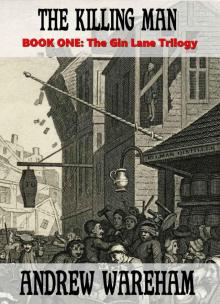 The Killing Man
The Killing Man Bold and Blooded
Bold and Blooded The Breaking Storm (Innocent No More Series, Book 2)
The Breaking Storm (Innocent No More Series, Book 2) Nobody’s Child
Nobody’s Child 04 Peking Nightmares (The Earl’s Other Son Series, #4)
04 Peking Nightmares (The Earl’s Other Son Series, #4) Red Man
Red Man Foreign Mud
Foreign Mud The Gathering Clouds (Innocent No More Series, Book 1)
The Gathering Clouds (Innocent No More Series, Book 1) 06 A Soldier’s Farewell (Man of Conflict #6)
06 A Soldier’s Farewell (Man of Conflict #6) Chinese Whispers
Chinese Whispers 02 Shanghai Dreams (The Earl’s Other Son #2)
02 Shanghai Dreams (The Earl’s Other Son #2) Hungry Harry: An Orphan in the Ranks
Hungry Harry: An Orphan in the Ranks A Wretched Victory (Innocents At War Series, Book 6)
A Wretched Victory (Innocents At War Series, Book 6) Illusions Of Change (A Poor Man at the Gate Series Book 6)
Illusions Of Change (A Poor Man at the Gate Series Book 6) The Wages Of Virtue (A Poor Man at the Gate Series, Book 8)
The Wages Of Virtue (A Poor Man at the Gate Series, Book 8) Blood and Famine (Man of Conflict Series, Book 4)
Blood and Famine (Man of Conflict Series, Book 4) The Friendly Sea (The Duty and Destiny Series, Book 1)
The Friendly Sea (The Duty and Destiny Series, Book 1) Bursting Balloons (Innocents At War Series, Book 5)
Bursting Balloons (Innocents At War Series, Book 5) The Death of Hope
The Death of Hope Deadly Shores (The Duty and Destiny Series, Book 11)
Deadly Shores (The Duty and Destiny Series, Book 11) The Vice Of Virtue (A Poor Man At The Gate Series Book 10)
The Vice Of Virtue (A Poor Man At The Gate Series Book 10) Virtue’s Reward (A Poor Man at the Gate Series, Book 11)
Virtue’s Reward (A Poor Man at the Gate Series, Book 11) A Deadly Caper (Innocents At War Series, Book 2)
A Deadly Caper (Innocents At War Series, Book 2) The Pain Of Privilege (A Poor Man at the Gate Series Book 4)
The Pain Of Privilege (A Poor Man at the Gate Series Book 4) Far Foreign (The Duty and Destiny Series, Book 9)
Far Foreign (The Duty and Destiny Series, Book 9) Shores of Barbary (The Duty and Destiny Series, Book 12)
Shores of Barbary (The Duty and Destiny Series, Book 12)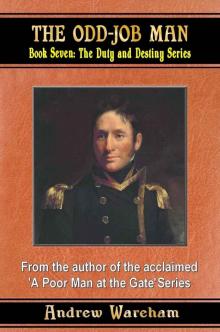 The Odd-Job Man (The Duty and Destiny Series, Book 7)
The Odd-Job Man (The Duty and Destiny Series, Book 7) Fire and Folly (Man of Conflict Series Book 3)
Fire and Folly (Man of Conflict Series Book 3) A Victorian Gent (The Making of a Man Series, Book 1)
A Victorian Gent (The Making of a Man Series, Book 1) Sugar and Spice (The Duty and Destiny Series, Book 6)
Sugar and Spice (The Duty and Destiny Series, Book 6) Dark Days Of Summer (Innocents At War Series, Book 4)
Dark Days Of Summer (Innocents At War Series, Book 4) Dire Shenanigans (The Making of a Man Series, Book 2)
Dire Shenanigans (The Making of a Man Series, Book 2) The Fuzzy-Wuzzy Man (The Duty and Destiny Series, Book 3)
The Fuzzy-Wuzzy Man (The Duty and Destiny Series, Book 3) Privilege Preserved (A Poor Man at the Gate Series Book 5)
Privilege Preserved (A Poor Man at the Gate Series Book 5) No Longer A Game (Innocents At War Series, Book 3)
No Longer A Game (Innocents At War Series, Book 3)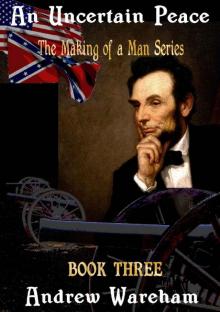 An Uncertain Peace (The Making of a Man Series, Book 3)
An Uncertain Peace (The Making of a Man Series, Book 3)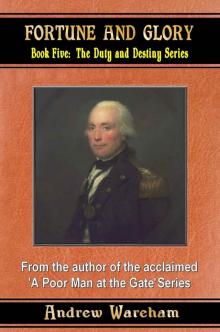 Fortune And Glory (The Duty and Destiny Series, Book 5)
Fortune And Glory (The Duty and Destiny Series, Book 5) The Old Order (A Poor Man at the Gate Series Book 7)
The Old Order (A Poor Man at the Gate Series Book 7) A Place Called Home (Cannibal Country Trilogy, Book 2)
A Place Called Home (Cannibal Country Trilogy, Book 2) Nouveau Riche (A Poor Man at the Gate Series, Book 2)
Nouveau Riche (A Poor Man at the Gate Series, Book 2) The Privateersman (A Poor Man at the Gate Series Book 1)
The Privateersman (A Poor Man at the Gate Series Book 1) Britannia’s Son (The Duty and Destiny Series, Book 4)
Britannia’s Son (The Duty and Destiny Series, Book 4) Long Way Place (Cannibal Country Trilogy, Book 1)
Long Way Place (Cannibal Country Trilogy, Book 1) Spanish Tricks (Man of Conflict Series, Book 5)
Spanish Tricks (Man of Conflict Series, Book 5) A Parade Of Virtue (A Poor Man At The Gate Series Book 9)
A Parade Of Virtue (A Poor Man At The Gate Series Book 9) A Busy Season (The Duty and Destiny Series, Book 8)
A Busy Season (The Duty and Destiny Series, Book 8) Billy Bacon and the Soldier Slaves (Colonial Warrior Series, Book 1)
Billy Bacon and the Soldier Slaves (Colonial Warrior Series, Book 1) Raging Rajahs (Man of Conflict Series, Book 2)
Raging Rajahs (Man of Conflict Series, Book 2)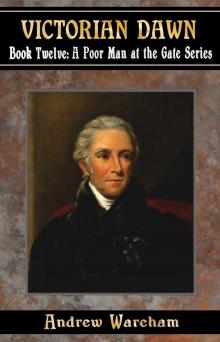 Victorian Dawn (A Poor Man at the Gate Series, Book 12)
Victorian Dawn (A Poor Man at the Gate Series, Book 12) Born To Privilege (A Poor Man at the Gate Series Book 3)
Born To Privilege (A Poor Man at the Gate Series Book 3) The Soldier Brat (Man of Conflict Series, Book 1)
The Soldier Brat (Man of Conflict Series, Book 1)